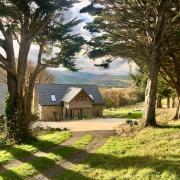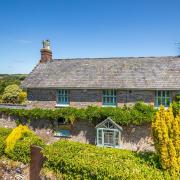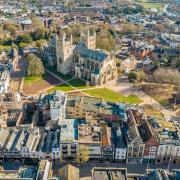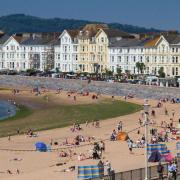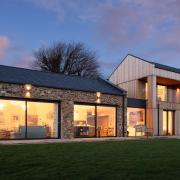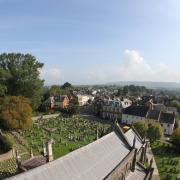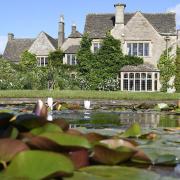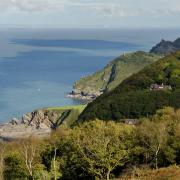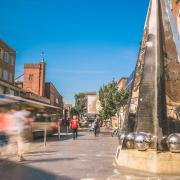Situated on the Exe Estuary in Devon, Topsham was once a major port and shipbuilding centre involved in international trade.
Situated on the Exe Estuary, Topsham was once a major port and shipbuilding centre involved in international trade. Today the river remains a strong focus, and added to that are all kinds of other distractions, making Topsham one of the most sought-after postcodes in Devon.
Going Dutch
The Golden Age in Topsham was between the late 17th and early 18th centuries, when it was at the height of its shipbuilding and trading prosperity. Many of the town’s finest buildings date from this era, particularly those on The Strand. Known as ‘Dutch’ houses, these buildings were home to the wealthiest merchants and shipowners, their rounded gable-ends resembling the fashionable merchant houses in the Dutch ports. Topsham ships regularly transported wool and cotton to Holland, and returned home with ballast comprising small Dutch bricks, or ‘clinkers’, which were then used in the construction of buildings. There are also numerous examples of attractive Georgian and Edwardian architecture throughout the town – the wonderful Follett Lodge on Ferry Road, for instance – and some lovely waterside gardens.
Treats
Topsham has retained its independent spirit when it comes to commerce. The Oliva Kitchen on Fore Street is a new delicatessen, its window packed with treats that take temptation to a new level. On the same side of the street is Piccalily, a lovely little flower shop that sells gifts too, including 100% organic candles in the most tantalising fragrances. As well as a great selection of wine, Topsham Wines on High Street has an extensive range of international drinks, including Denmark’s famed Gammel Dansk.
Al fresco splash
Even when the sea is too nippy for comfort, Topshamites can indulge their inner water-baby at the outdoor swimming pool, which is just off the High Street in the town centre. Opened in 1979 following a huge fundraising effort (including jumble sales, bottle collecting and carnival floats), the pool is still run by volunteers, excluding the lifeguard. Open from mid-May until September, the pool is 100% chlorine-free and is heated to a glorious 28�C by solar panels. Keen members can take to the water from 6.30am, and enjoy their morning swim amid the rising steam.
Hollywood and cream teas
If you want to find out more about the town’s origins head for the Strand and Topsham Museum, where part of the building comprises the original 17th-century house, which is decorated to give an idea of life in those days. There is a room dedicated to the actress Vivien Leigh, who was married – before Laurence Olivier – to the brother of former owner and museum benefactress Dorothy Holman; the nightdress she wore in Gone with the Wind is on display here. Across the road there is a lovely riverside garden to enjoy, and the in-house caf� is renowned for its cream teas.
Goats and boats
One of the nicest and simplest walks is to follow Elm Grove Road by the station to Bowling Green Road, which takes you through to the nature reserve at Bowling Green Marsh. Past Riversmeet House, the beach walk becomes the curiously named Goat Walk, which leads back towards The Strand and on into town. The name Goat Walk dates from the council meeting called to decide the name of the new riverside walk when it was built in 1908. When suggestions were made for ‘esplanade this’ and ‘promenade that’, a local man took all the bluster out of the situation by announcing: ‘It’s nowt but a bloody goat walk!’ Plain talking won out, and the name stuck.
Birds and paradise...
Behind the sea wall along the Goat Walk is Bowling Green Marsh, an area of wetland that forms part of the Exe Estuary Nature Reserve. A perfect spot for birdwatching at any time of year – the path just before the Goat Walk leads through a small field to a raised viewing platform that looks over the mud flats, or there’s a hide in the Marsh itself – the Reserve is the only place in Devon where lapwing and redshank breed. Early summer is the time to catch sight of chicks feeding beside the pools, and later in the season sees the return of black-tailed godwits, ringed plovers and sandpipers. Between November and February, the RSPB runs mini-cruises from Topsham to watch avocets.
Refresh
With a plethora of inns and caf�s, Topsham offers plenty of choice when it comes to refreshing the palate. The Avocet caf� on Fore Street isn’t far from anyone’s lips when recommendations are called for, and the Passage House Inn on Ferry Road – one of the oldest pubs in town – has riverside tables that are perfect for a relaxing drink as the sun sets. If you fancy seeing Topsham from a different angle, grab the ferry across to the Turf Hotel, whose huge garden is bordered by the Turf Locks on one side and the Exe Estuary on the other.
GETTING THERE
By car: exit the M5 at Junction 30, then follow the A376 towards Exmouth, turning right at the Clyst St Mary roundabout
By train: from Exeter St David’s and Central stations every half hour
By bus: the 57 Exeter-Exmouth bus stops in the town every 12 minutes
GPS Ref: EX3 0AX



